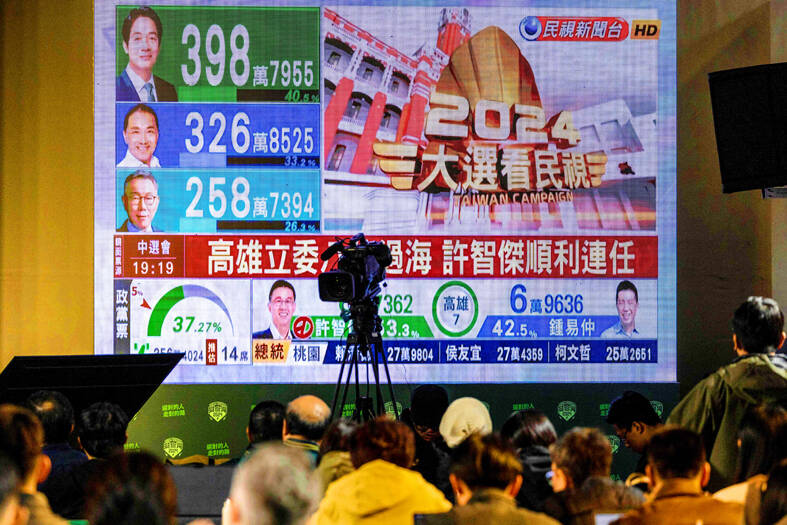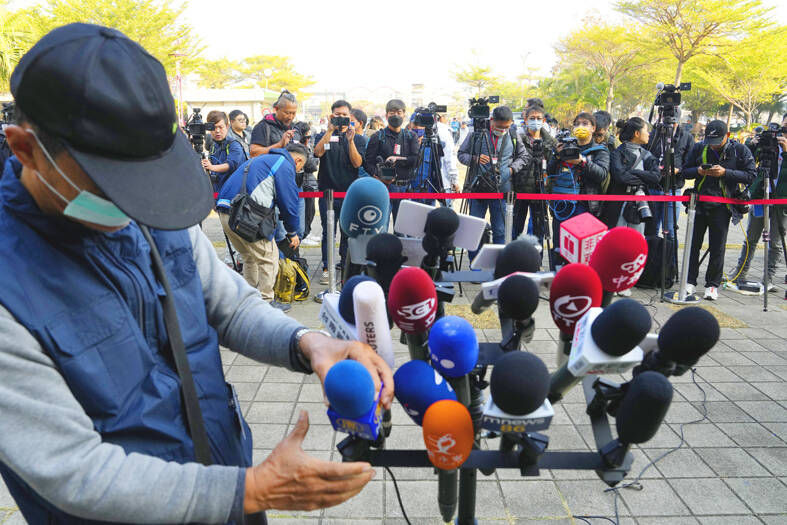While the Democratic Progressive Party (DPP) yesterday won the presidential election, political watchers said that it faces an unprecedented three-way split in the Legislative Yuan that might see the formation of the first non-partisan Cabinet, which would also be a first for the Taiwan.
Pundits said that once Vice President William Lai (賴清德) takes office, he would face a tough time in the legislature, as the DPP has lost its majority.
The DPP won 51 legislative seats, the KMT won 52 and the TPP eight.

Photo: Alastair Pike, AFP
The DPP, which had held a majority in the 113-seat body since 2016, had a net loss of 11 seats, dropping from 62 and losing its position of dominance.
Lai would have a tougher time than former president Chen Shui-bian (陳水扁), whose presidency from 2000 to 2008 coincided with a KMT legislative majority, academics said, adding that Lai must think about how he will interact with a three-way split in the branch.
Political commentator Huang Yang-ming (黃揚明) said that Lai would have to learn how to make compromises with the other parties.

Photo: Ng Han Guan, AP
During an international news conference announcing his victory, Lai said he would look into measures to appoint people to positions without partisan bias.
The three-way split in the legislature highlights the need for communication, participation and collaboration among all parties, Lai said, adding that he would mull measures on how to incorporate the policy platforms of the KMT’s presidential candidate, New Taipei City Mayor Hou You-yi (侯友宜) and Taiwan People’s Party Chairman Ko Wen-je (柯文哲).
Hou would be forced to consider how to mend relations with DPP supporters as he continues his mayoral term, Huang said, adding that the outcome of the presidential election might have terminated Hou’s political career.
Winning over the younger generation and the KMT’s cross-strait policy remain key factors in how the party would remain politically relevant, Huang said.
The TPP will have to consider how it fosters its support base for another presidential bid, he said.
Meanwhile, Reuters reported that Lai would have limited ability to pass legislation without a legislative majority.
He could appoint a Cabinet with some opposition or non-party figures to show that he is willing to reach across the political aisle to get laws passed, it reported.
However, the opposition might not want to play ball, it said.
China, which had portrayed the presidential election as a choice between war and peace, might be mollified that Lai, unlike President Tsai Ing-wen (蔡英文), will not have free rein to do what he wants, the report said, adding that it might not react too strongly to his election victory.
China could hold back until Lai’s inauguration speech on May 20, but might initiate some form of military response or increase its economic coercion in response to his victory, it said.
Lai is a “known quantity” for the US, having served as vice president since 2020, and he has repeatedly pledged not to change the “status quo” across the Taiwan Strait and offered talks with China, it added.
Lai and Tsai reject Beijing’s sovereignty claims over Taiwan, and say Taiwan is already an independent country and its people should decide its future, it said.
The presidential election is seen as having “real and lasting influence on the geopolitical landscape,” said Gabrielle Reid, associate director of the global intelligence consultancy S-RM.
“The outcome of the vote will ultimately determine the nature of ties with China relative to the West and will have a strong bearing on the state of play in the South China Sea,” she said.
Additional reporting by Yang Cheng-yu, CNA and AP

The CIA has a message for Chinese government officials worried about their place in Chinese President Xi Jinping’s (習近平) government: Come work with us. The agency released two Mandarin-language videos on social media on Thursday inviting disgruntled officials to contact the CIA. The recruitment videos posted on YouTube and X racked up more than 5 million views combined in their first day. The outreach comes as CIA Director John Ratcliffe has vowed to boost the agency’s use of intelligence from human sources and its focus on China, which has recently targeted US officials with its own espionage operations. The videos are “aimed at

STEADFAST FRIEND: The bills encourage increased Taiwan-US engagement and address China’s distortion of UN Resolution 2758 to isolate Taiwan internationally The Presidential Office yesterday thanked the US House of Representatives for unanimously passing two Taiwan-related bills highlighting its solid support for Taiwan’s democracy and global participation, and for deepening bilateral relations. One of the bills, the Taiwan Assurance Implementation Act, requires the US Department of State to periodically review its guidelines for engagement with Taiwan, and report to the US Congress on the guidelines and plans to lift self-imposed limitations on US-Taiwan engagement. The other bill is the Taiwan International Solidarity Act, which clarifies that UN Resolution 2758 does not address the issue of the representation of Taiwan or its people in

US Indo-Pacific Commander Admiral Samuel Paparo on Friday expressed concern over the rate at which China is diversifying its military exercises, the Financial Times (FT) reported on Saturday. “The rates of change on the depth and breadth of their exercises is the one non-linear effect that I’ve seen in the last year that wakes me up at night or keeps me up at night,” Paparo was quoted by FT as saying while attending the annual Sedona Forum at the McCain Institute in Arizona. Paparo also expressed concern over the speed with which China was expanding its military. While the US

SHIFT: Taiwan’s better-than-expected first-quarter GDP and signs of weakness in the US have driven global capital back to emerging markets, the central bank head said The central bank yesterday blamed market speculation for the steep rise in the local currency, and urged exporters and financial institutions to stay calm and stop panic sell-offs to avoid hurting their own profitability. The nation’s top monetary policymaker said that it would step in, if necessary, to maintain order and stability in the foreign exchange market. The remarks came as the NT dollar yesterday closed up NT$0.919 to NT$30.145 against the US dollar in Taipei trading, after rising as high as NT$29.59 in intraday trading. The local currency has surged 5.85 percent against the greenback over the past two sessions, central